 2017 sees the 50th anniversary of the decriminalization of homosexuality in England. To mark this important anniversary, the Pink Singers will be running a year-long series of events, focusing on India, where this law remains in the penal code and continues to oppress tens of millions of people.
2017 sees the 50th anniversary of the decriminalization of homosexuality in England. To mark this important anniversary, the Pink Singers will be running a year-long series of events, focusing on India, where this law remains in the penal code and continues to oppress tens of millions of people.
Our first event, last Sunday, was a seminar -“Queer India Today: Identity, Intersectionality and Illegality” – which examined aspects of gay, lesbian and transgender identity in India. It featured some fantastic presentations from three academics from the London-based School of African and Oriental Studies (SOAS) and a special guest via Skype, from Paris!
For those of you who missed it, here ‘s a summary from one of our sopranos, Zoe.
 The first presenter, Daniel J Luther, discussed the legal framework behind the criminalisation of homosexuality in India, with particular emphasis on Section 377 of the Indian Penal Code. Section 377 is the Indian law prohibiting same-sex activity, which was drafted by colonialists in the early 1800s to mirror British anti-sodomy laws, repealed in 2009 by the High Court of India, and re-instituted in 2013 by the Indian Supreme Court.
The first presenter, Daniel J Luther, discussed the legal framework behind the criminalisation of homosexuality in India, with particular emphasis on Section 377 of the Indian Penal Code. Section 377 is the Indian law prohibiting same-sex activity, which was drafted by colonialists in the early 1800s to mirror British anti-sodomy laws, repealed in 2009 by the High Court of India, and re-instituted in 2013 by the Indian Supreme Court.
Daniel spoke of the sense of celebration and relief felt in Indian gay communities after the decision to repeal Section 377 in 2009, which prompted many people to come out to their friends and family; the sense of dismay felt after the law was re-instituted; and the hope that despite re-criminalisation, the groundwork for acceptance had already been laid. They also noted that while law reform is important in promoting acceptance of LGBT people, there are still strict social codes in India which condemn non-normative sexuality and gender expression – and that social activism is an equally, if not more important step towards breaking or broadening these codes.

 The second presenter, Jacquelyn Strey, spoke about her research on queer female experiences in Mumbai and Bangalore. Jacquelyn spoke of the double social pressures queer women face due to the historic marginalisation of both women and LGBT people in India. In particular, she noted that while gay men are able to freely occupy public space, make connections with each other and move away from home or out of the country to find a safer space to express themselves, queer women are often under strong family pressure to get married, are unable to rent or buy a property without the consent of their father or husband, and isolated from others in their position due to their location outside of the public sphere.
The second presenter, Jacquelyn Strey, spoke about her research on queer female experiences in Mumbai and Bangalore. Jacquelyn spoke of the double social pressures queer women face due to the historic marginalisation of both women and LGBT people in India. In particular, she noted that while gay men are able to freely occupy public space, make connections with each other and move away from home or out of the country to find a safer space to express themselves, queer women are often under strong family pressure to get married, are unable to rent or buy a property without the consent of their father or husband, and isolated from others in their position due to their location outside of the public sphere.
A severe consequence of this widespread social isolation and desperation is that it has become fairly common for young female couples to commit joint suicides, when faced with the prospect of a lifelong sexual commitment to a man. Even female couples who are brave enough to try to run away together run the risk of being detained by the police and the older partner charged with kidnapping or falsely imprisoning the younger one. Despite these ever-present narratives, however, Jacquelyn informed us that there was a burgeoning lesbian social scene in Mumbai, including an activist group called LABIA which campaigns for the acceptance of queer women, no matter their caste, religion, or other social identifiers.

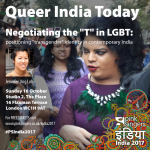 The third presenter, Jennifer Ung Loh, spoke about the “hijra” community in India and the particular challenges they face. Hijras are trans-feminine people who were assigned male at birth, and have historically held a special role in Hindu mythology, serving as spiritual guides for couples hoping to conceive a child. Today, hijras are often rejected from their birth families and form new, tight-knit communities together, organising themselves into strict hierarchies that determine who earns money, carries out household chores and cares for the children. Hijras are dispersed throughout cities and rural areas, and often adopt gender non-confirming children whose parents no longer want them, or street children who need a home. Hijras are universally marginalised and find it extremely difficult to find employment (unless as as sex workers, and more recently, at sexual health clinics).
The third presenter, Jennifer Ung Loh, spoke about the “hijra” community in India and the particular challenges they face. Hijras are trans-feminine people who were assigned male at birth, and have historically held a special role in Hindu mythology, serving as spiritual guides for couples hoping to conceive a child. Today, hijras are often rejected from their birth families and form new, tight-knit communities together, organising themselves into strict hierarchies that determine who earns money, carries out household chores and cares for the children. Hijras are dispersed throughout cities and rural areas, and often adopt gender non-confirming children whose parents no longer want them, or street children who need a home. Hijras are universally marginalised and find it extremely difficult to find employment (unless as as sex workers, and more recently, at sexual health clinics).
Jenny spoke about the difficulties around including hijras in modern LGBT activism, as they are at once more marginalised and more recognised in society than gay men and lesbians. Because they are so visible, for example, they are acknowledged by the government as a group needing support (where gay men and lesbians are not), but they are also completely isolated from mainstream society, unable to work in many professions, and estranged from their birth families.

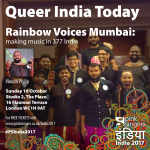 The seminar concluded with a presentation (from Paris, via skype!) with Vinodh Philip, founding member of Rainbow Voices Mumbai, which is the choir we will be meeting during our January trip. Vinodh provided some invaluable information about being gay in Mumbai, including his own story of making his way as a young gay man in the city.
The seminar concluded with a presentation (from Paris, via skype!) with Vinodh Philip, founding member of Rainbow Voices Mumbai, which is the choir we will be meeting during our January trip. Vinodh provided some invaluable information about being gay in Mumbai, including his own story of making his way as a young gay man in the city.
He also talked abut his decision to start the Rainbow Voices choir as a safe space to sing and express himself after homosexuality was re-criminalised in 2013, and the current functions of the choir today. Vinodh really gave us a taste of the choir, and was very entertaining as well!
It was clear from the speakers’ presentations that the LGBT community in India is extraordinarily diverse, complex and nuanced. Though I was already excited about our trip to Mumbai, the seminar gave me a new desire to learn more about the communities we’ll be visiting, and a richer understanding of their contexts. So… next stop: Mumbai!

 Our stories and experiences about coming out can change perceptions, create new advocates for equality and perhaps most importantly, allow someone who’s thinking about coming out to take that step. Today, 11 October, is the 28th anniversary of
Our stories and experiences about coming out can change perceptions, create new advocates for equality and perhaps most importantly, allow someone who’s thinking about coming out to take that step. Today, 11 October, is the 28th anniversary of  I went away to university the September of the year I turned 18. I’d cautiously come out to a select few friends and family members over the preceding months, and the reactions had been mixed to say the least, so I couldn’t wait to start afresh. First thing I did was join the then-LGB society (it feels strange to type that now), and found myself surrounded by people like me for the first time in my life. It was a heady feeling, liberating and startling and overwhelming and reassuring all at once. I met the woman who would go on to become my partner to this day, met friends whose struggles and victories became interwoven with mine, and finally reached a place where I felt strong enough to be honest with my parents.
I went away to university the September of the year I turned 18. I’d cautiously come out to a select few friends and family members over the preceding months, and the reactions had been mixed to say the least, so I couldn’t wait to start afresh. First thing I did was join the then-LGB society (it feels strange to type that now), and found myself surrounded by people like me for the first time in my life. It was a heady feeling, liberating and startling and overwhelming and reassuring all at once. I met the woman who would go on to become my partner to this day, met friends whose struggles and victories became interwoven with mine, and finally reached a place where I felt strong enough to be honest with my parents. We drove home the next day. By this point my concept of home had already shifted to university, to my girlfriend and friends who accepted me, rather than the place I’d been born and lived the first 18 years of my life. I sincerely thought that I was leaving and never coming back, but some part of my brain wasn’t willing to give up that easily. I loved my parents, even if they couldn’t give me the unconditional acceptance I’d hoped for, and when I got back to uni I called to let them know I was okay. The conversation was stilted and careful, over quickly – as all our conversations would be for the next six months or so – and made no mention of what I’d said or what had happened afterwards.
We drove home the next day. By this point my concept of home had already shifted to university, to my girlfriend and friends who accepted me, rather than the place I’d been born and lived the first 18 years of my life. I sincerely thought that I was leaving and never coming back, but some part of my brain wasn’t willing to give up that easily. I loved my parents, even if they couldn’t give me the unconditional acceptance I’d hoped for, and when I got back to uni I called to let them know I was okay. The conversation was stilted and careful, over quickly – as all our conversations would be for the next six months or so – and made no mention of what I’d said or what had happened afterwards. And the thing is, it really does get easier. That first time – telling your parents, your friends, whoever the big, important ‘first’ is to you – is huge no matter how they react, but you never stop having to come out after that. There will always be a new neighbour, some relatives you haven’t seen for ages, new colleagues or classmates, some random customer service person or healthcare professional… These people will make assumptions about you, and sometimes, you’ll have to correct those assumptions. Don’t try and take responsibility for other people’s feelings: if they’re disgusted or upset or otherwise negative, that’s all on them, not on you. I’m not saying you should be hard-hearted, but you do need to learn what is and isn’t worth worrying about, and trust me, someone else’s opinions on how you should live your life falls firmly into the ‘not worth it’ category.
And the thing is, it really does get easier. That first time – telling your parents, your friends, whoever the big, important ‘first’ is to you – is huge no matter how they react, but you never stop having to come out after that. There will always be a new neighbour, some relatives you haven’t seen for ages, new colleagues or classmates, some random customer service person or healthcare professional… These people will make assumptions about you, and sometimes, you’ll have to correct those assumptions. Don’t try and take responsibility for other people’s feelings: if they’re disgusted or upset or otherwise negative, that’s all on them, not on you. I’m not saying you should be hard-hearted, but you do need to learn what is and isn’t worth worrying about, and trust me, someone else’s opinions on how you should live your life falls firmly into the ‘not worth it’ category.
 In fact, we have hosted this choral jamboree ourselves on a couple of occasions, our first being the fifth festival in the late 80s. Titled “Singing the Blues Away”, a deliberate dig at the Conservative party of the day, it took place at the height of
In fact, we have hosted this choral jamboree ourselves on a couple of occasions, our first being the fifth festival in the late 80s. Titled “Singing the Blues Away”, a deliberate dig at the Conservative party of the day, it took place at the height of 


 Our new season has started with a bang, and rehearsals are already in full swing. Radha has just joined our alto section and tells us a bit about what it’s like to be a ‘newbie’!
Our new season has started with a bang, and rehearsals are already in full swing. Radha has just joined our alto section and tells us a bit about what it’s like to be a ‘newbie’! My journey began via word of mouth – I had heard of the Pink Singers from a friend and was intrigued to discover more. I need somewhere to reignite my fire for music and singing that I had lost about five years ago.
My journey began via word of mouth – I had heard of the Pink Singers from a friend and was intrigued to discover more. I need somewhere to reignite my fire for music and singing that I had lost about five years ago. And so my journey led me on to my audition. I fell so far flat on my first note that it would have been preferable for the ground to swallow me whole at that point! However Murray, our Musical Director, and the gang encouraged me to keep going and gave me the opportunity to shine. They didn’t try to catch me out or criticise me when they could see I was a bit out of practice – instead, they saw the potential I had and invited me to join The Pink Singers and continue onwards to rediscovering my passion for music.
And so my journey led me on to my audition. I fell so far flat on my first note that it would have been preferable for the ground to swallow me whole at that point! However Murray, our Musical Director, and the gang encouraged me to keep going and gave me the opportunity to shine. They didn’t try to catch me out or criticise me when they could see I was a bit out of practice – instead, they saw the potential I had and invited me to join The Pink Singers and continue onwards to rediscovering my passion for music. This week has been a whirlwind and we’re soon to be starting choreography to match these angelic voices. Watch out, world! You’re in for a ride!
This week has been a whirlwind and we’re soon to be starting choreography to match these angelic voices. Watch out, world! You’re in for a ride! Interesting fact: A lesser-known fact about me is that I’m a lapsed runner – in 2010 I ran the London marathon and it was painfully epic!
Interesting fact: A lesser-known fact about me is that I’m a lapsed runner – in 2010 I ran the London marathon and it was painfully epic! Interesting fact: I neither love nor hate marmite.
Interesting fact: I neither love nor hate marmite.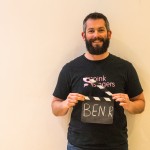 Interesting fact: I’m a complete ‘cynophile’, a person who loves dogs!
Interesting fact: I’m a complete ‘cynophile’, a person who loves dogs! Interesting fact: I was once charged by a hippo in Kenya’s Maasai Mara National Park.
Interesting fact: I was once charged by a hippo in Kenya’s Maasai Mara National Park. Interesting fact: I am a very keen horticulturalist enjoying growing vegetables on my allotment.
Interesting fact: I am a very keen horticulturalist enjoying growing vegetables on my allotment. Interesting fact: One of my passions is travel, and especially to climb mountains. I always find the highest mountain wherever I go!
Interesting fact: One of my passions is travel, and especially to climb mountains. I always find the highest mountain wherever I go! Interesting fact: I love skiing and travelling. My father makes the best waffles in the world with a recipe from my gran.
Interesting fact: I love skiing and travelling. My father makes the best waffles in the world with a recipe from my gran. Interesting fact: I have visited 33 countries in the past two years.
Interesting fact: I have visited 33 countries in the past two years.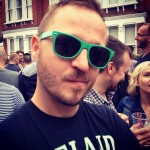 Interesting fact: My favourite colour is red, my favourite food is lasagne, my favourite drink is dark spiced rum and I have webbed toes on my right foot!
Interesting fact: My favourite colour is red, my favourite food is lasagne, my favourite drink is dark spiced rum and I have webbed toes on my right foot! Interesting fact: I absolutely love playing board games and cards and once played bridge with one of the top ten Bridge Masters in the USA.
Interesting fact: I absolutely love playing board games and cards and once played bridge with one of the top ten Bridge Masters in the USA. Interesting fact: My proudest achievement is winning two Blue Peter badges. I don’t need much encouragement to wear them…
Interesting fact: My proudest achievement is winning two Blue Peter badges. I don’t need much encouragement to wear them…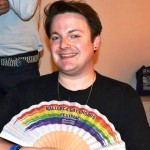 Interesting fact: Not many people know that my first word was a Cantonese swearword, i couldn’t possibly reveal it 😉
Interesting fact: Not many people know that my first word was a Cantonese swearword, i couldn’t possibly reveal it 😉